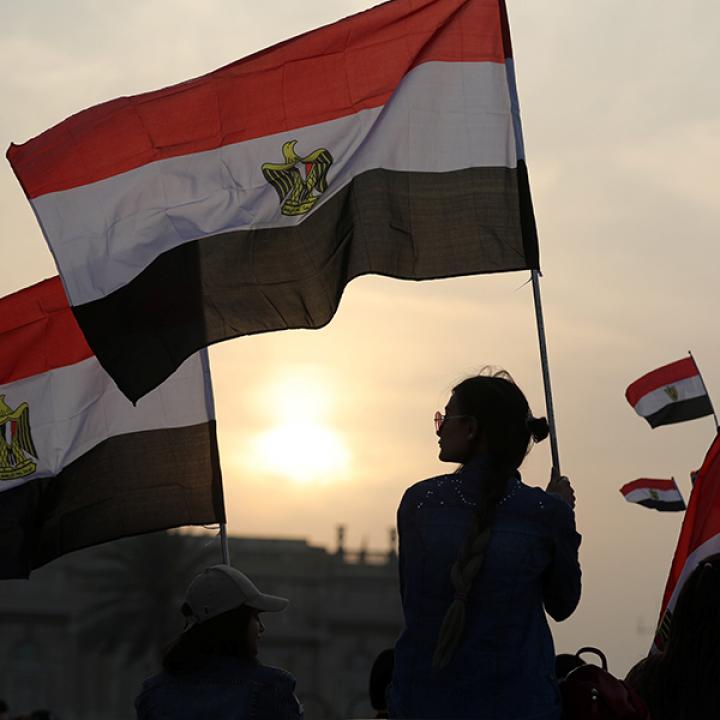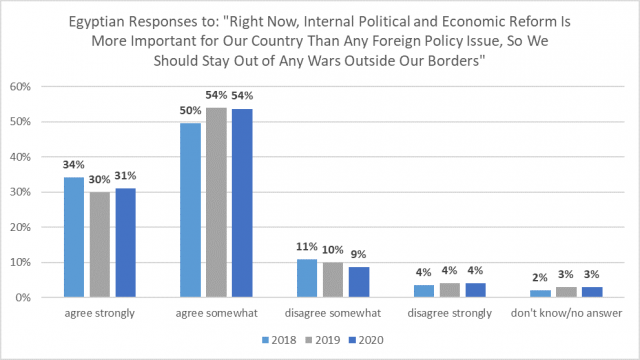
- Policy Analysis
- Fikra Forum
Egyptian Public Concerned About Internal Problems, Not Israel; Government Policies Rated Poorly, But Mixed Views on Protest

New data from a rare independent opinion poll show that the Egyptian public is much more concerned about domestic problems, including public health, than any foreign policy issue. And when it comes to foreign affairs and U.S. policy, only a third put the Israeli-Palestinian conflict at the top of their priority list.
Eighty-five percent of Egyptians agree with the statement: “Right now, internal political and economic reform is more important for our country than any foreign policy issue,” with a third strongly agreeing. These figures are roughly consistent with those from polling during the past several years.
Relatively Low Interest, and Even Lower Expectations, on Israeli-Palestinian Issues
More surprisingly, on foreign policy, only a third of Egyptians now rank “pushing for a two-state solution to the Palestinian-Israeli conflict” in first place as their priority for U.S. engagement in the region. The majority of responses to this question are split between U.S. action on Iran, Yemen, Syria, and Libya. And a third of Egyptians say that “the Palestinians and the Israelis are both to blame for their continuing conflict.”
This pattern is likely due in part to the Egyptian public’s very low expectations for progress on the Palestinian problem. A mere 16 % have even “somewhat positive” expectations of the new Israeli government elected this spring. And even fewer, just 9%, have a favorable opinion of the Trump peace plan.
There is also very little popular support for further “normalization” with Israel. A mere 6% agree that “people who want to have business or sports contacts with Israelis should be allowed to do so.” By contrast, half the Egyptian public “strongly disagrees” with that assertion.
Coronavirus Crisis Concerns, Both Domestic and Foreign
Fully three-fourths of Egyptians say their government is currently doing “too little” to ensure “people’s health and medical care.” At the same time, many Egyptians blame outside parties for the disease as well. Nearly half (45%) agree with the proposition: “The coronavirus is something our foreign enemies deliberately started.”
Government Also Gets Low Marks in Other Areas
By somewhat smaller majorities, Egyptians also say their government is failing them in the three other domestic policy issues polled. Fifty-nine percent say Cairo is doing “too little” in “maintaining law and order in our public places.” Sixty-four percent say the same about “preventing religious extremism in our society.” And in an intriguing meta-question, a larger majority (68%) agreed with the statement that the Egyptian government does too little in “paying attention to public opinion about its policies.” Polls in the past few years have also shown widespread complaints about corruption, economic conditions, and lack of equity in sharing civic obligations.
So Why No Uprising in Egypt?
Compared with the Egyptian majority’s recent dissatisfaction with their government’s policies, there is less popular appetite for mass protests against it. Opinions on protests are split: 42% say “it’s a good thing we aren’t having big street demonstrations here now the way they do in some other Arab countries;” yet somewhat more, a surprisingly high 54%, disagree with that assessment.
At the same time, an equally narrow majority of Egyptians, (54%), also agree with the notion: “When I think about what’s happening in Yemen or Syria, I feel that our own situation is not so bad.” And only a third expect any positive results from “the anti-government protests in Iraq and Lebanon.”
Half of Egyptians Still Call U.S. Ties Important, Ahead of Russia But Just Behind China
Even though very few Egyptians like the Trump Peace Plan, many more (49%), as in previous years, continue to say that good relations with the U.S. are important for their country. China now registers in the same league (53%). Interestingly, Russia lags somewhat in this category (39%), despite recent arms and business deals with Cairo and closer coordination on the Libyan civil war right across the border.
Some Popular Concern About Libya, Yet Mixed Views of Turkey
Asked about their top priority for U.S. Mideast policy, a quarter of Egyptians now pick “finding a diplomatic settlement for the wars in Yemen and Libya”—in second place behind resolving the Palestinian issue (35%). At the same time, views on Turkey, Egypt’s main outside opponent in Libya, are unexpectedly divided. The majority (58%) say good ties with Turkey are not important for Egypt. But a substantial minority (39%) of Egyptians disagree, calling good relations with Ankara at least “somewhat important” for their own country.
Divided Opinion on Qassem Soleimani's Killing, with Iran a Low Priority
About a third of Egyptians say that the killing of Iranian General Qassem Soleimani last January will have positive effects on the region; but around the same proportion foresee negative effects. An unusually high 30% say that they don’t know enough to voice a view either way. Asked to pick their priority for U.S. policy in the region, just 19% choose “working to contain Iran,” compared with diplomatic efforts in other conflict arenas: Palestinian-Israeli (35%), Libya and Yemen (24%), or Syria (15%). More generally on Iran and its regional militias, previous polls have proved that most Egyptians side with their government in opposition to them: Iran itself, Hezbollah, the Houthis, and even Ayatollah Khamenei personally.
Public Wants Rapprochement with Qatar, but not Syria
On a couple of other, more sensitive regional issues, however, the Egyptian public appears mostly at odds with its government’s position. Three-quarters say “the way to solve our disputes with Qatar is for both sides to compromise in order to reach an agreement.” This high proportion is similar to that recorded in a 2017 poll, soon after that dispute first erupted.
In sharp contrast, just 10% of Egyptians agree with the following on Syria:“We should accept the reality that Bashar al-Assad will stay in power in Syria, and restore full relations with his government.” At the official level, so far, the Egyptian government has not done so—and if it pays more attention to its own public’s opinion than they think it does, it will keep its distance from Assad going forward as well.
Methodological Note
These findings are from a commercial survey, conducted by a highly credible regional firm in late May/early June 2020, among a representative national sample of 1,000 Egyptians. The survey comprised face-to-face interviews, selected according to standard random geographical probability procedures. The author has extensive personal experience with this company’s high standards of integrity, technical proficiency, and quality controls. The statistical margin of error for this sample is approximately 3%. Additional methodological details are readily available on request.









